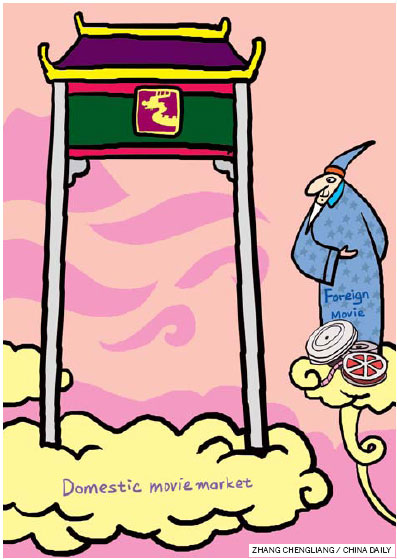Pulse
Debate: Movie quota
(China Daily)
Updated: 2011-03-31 07:58
 |
Large Medium Small |

A controversial ruling by the World Trade Organization demands China lifts its restriction on allowing just 20 foreign films to be shown at cinemas nationwide every year.
Lee Hannon
Nation should be taken, not stirred
This is happening whether we like it or not.
Most experts agree China will raise its annual 20-movie limit on the number of foreign films it allows to be shown in the country. But let's get one thing straight: China will do this not because the World Trade Organization deadline to end the quota passed on March 19, but because it is in its own interest to do so knowing the power to decide the future of the film industry ultimately lies with Chinese consumers.
The figures speak for themselves. China is ranked sixth in global box office revenues. Those 20 foreign movies account for 45 percent of box office receipts in a market of more than 500 domestic films. Avatar made double the amount in profit than China's highest-earning homegrown movie of all time, Let the Bullets Fly.
Chinese people want to see motion pictures from overseas, and they are intelligent enough to know their culture goes far beyond 90 minutes of looking at a big screen in a dark room. For most of them, switching on their television sets each night offers an instant reminder that Western-influenced narratives fill the airwaves.
And if that doesn't convince you that it's a little late in the game to build a Great Wall around Western movies, then consider this: China's box office receipts totaled $1.5 billion in 2010, while the country's bootleg DVD industry, which is mostly made up of Western films, reportedly generated $6 billion. Personally, and this may be a debate for another day, I would prefer my money go into China's pockets than the cigar-chomping, latte-sipping liberal fat cats of Hollywood.
Still need convincing? The Chinese government has said it expects 20,000 screens to be in operation by 2015. At the moment, it has just 6,200. You at the back of the class, tell me what percentage of the current revenue comes from a tiny portion of foreign movies?
And then there's Hainan Airlines. China's fourth-largest carrier is rumored to be eyeing a stake in the bankrupt United States film studio Metro-Goldwyn-Mayer after a failed bid last year. That would give China a controlling interest in the home of James Bond and a chance to rewrite a Hollywood ending.
The author is a copy editor for Chinadaily.com.cn and a former
Hollywood reporter for a national US magazine.
Han bingbin
Move will do little to boost our industry
Some of the people who support raising the import quota for foreign films in China cite a good reason: it will provide the domestic industry with fierce competition and prompt Chinese filmmakers to improve the quality of productions.
Sure enough, on a technical level, domestic films will be challenged. According to statistics website Box Office Mojo, Avatar alone grossed $182 million in China last year, dwarfing the $102 million generated by the country's highest-earning domestic film, Let the Bullets Fly.
The astounding success of Avatar showed the technical maturity of Hollywood films and helped take both standards and audience appreciation to new heights. It left filmmakers with no choice but to pursue higher quality.
Producers of the big-budget Journey to the West will reportedly spend $100 million on visual effects. Previously, $1 million would have been the ceiling. Neil Gaiman, the popular British science fiction and fantasy writer, has also been signed up to pen the script.
No doubt domestic sci-fi films will feature more vivid special effects in years to come, but I'm afraid that'll be all Chinese filmmakers learn from their foreign peers.
Due to China's strict policies, the films shown here are limited to just a few genres, so even if the import quota was 50 a year, most would still be sci-fi movies.
The rest will be realistic dramas awash with innocuous generalities. Even happy or "soft" movies will face having scenes deemed too bloody, sexy or superstitious being cut.
For those wanting more stimulating or refreshing entertainment, pirated DVDs will continue to be the only choice.
Raising the import quota won't help encourage more diversity in Chinese cinemas. I suppose then, in the eyes of more directors, the Chinese market will be seen as a moneymaking machine rather than a quality test stone.
Chinese audiences are also developing more tolerant and profound tastes, but there is doubt whether the market demand can be satisfied. Instead of bringing in what local viewers truly want, they'll probably simply end up introducing more foreign films for the sake of that one World Trade Organization requirement.
The WTO has its reasons for urging China to import more foreign films each year; it wants a free global market. Yet, with restrictions on content, simply increasing the number of movies that can be shown will do little to improve our domestic market.
The author is a reporter for METRO.
| 分享按钮 |